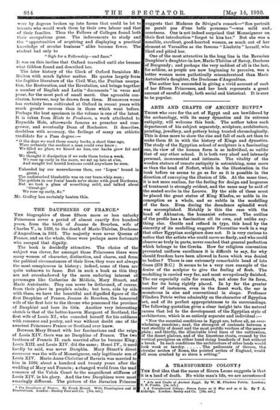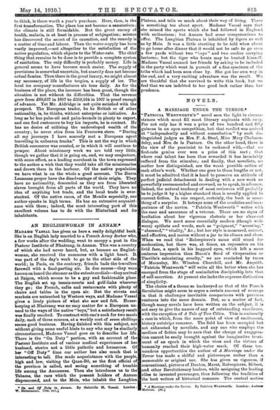A TRANSFORMED COLONY.1.
THE first idea that the name of Sierra Leone suggests is that it is a land of death. No white man's life, we are accustomed
• Arts and Crafts of Ancisnt Blot. By W. IL Flinders Petrie. London, T. N. Foulis. [5s. net.] t A Transformed Colony: Sierra Leone as it Was and as it Is. By T J. Aldridge. London; Seeley and Co. [Ws. net.]
to think, is there worth a year's purchase. Here, then, is the first transformation. The place has not become a sanatorium ; the climate is still formidable. But the great enemy of health, malaria, is at least in process of subjugation; science haa discovered the secret of its causation, and the remedy is a matter of time and labour. Then the water-supply has been vastly improved,—not altogether to the satisfaction of the native population, which objects to the Water-rate. The chief thing that remains to be done is to provide a complete system of sanitation. The only difficulty is probably money. Life in general seems to have become much easier. The supply of provisions is somewhat uncertain, but scarcity does not become actual famine. Then there is the great luxury, we might almost say necessary, of life in the tropics, a supply of ice. The local ice company manufactures six tons daily. As for the business of the place, the increase has been great, though the situation is not without its difficulties. That the revenue grew from £60,637 in 1887 to L359,101 in 1907 is proof enough of advance. Yet Mr. Aldridge is not quite satisfied with the prospect. The European trader, be he British or of other nationality, is, he thinks, without enterprise or initiative. As long as he has palm-oil and palm-kernels in plenty to export, and can find customers to buy his imports, he is content. He has no desire of utilising the undeveloped wealth of the country; he never stirs from his Freetown store. " During all my journeys I have scarcely met a European agent travelling in unbeaten tracks." This is not the way in which British commerce was created, or in which it will continue to prosper. About missionary work we are told very little, though we gather that it is going on, and, we may conjecture, with some effect, as a leading merchant in the town expressed to the author a wish that they would take all the missionaries and drown them in the harbour. Of the native population we have what is on the whole a good account. The Sierra Leoneans proper have the disadvantage of their origin. They have no nationality, descended as they are from liberated slaves brought from all parts of the world. They have no idea of anything but trade, and the local trade is over- stocked. Of the native races, of the Mendis especially, our author speaks in high terms. He has an extensive acquaint- ance with them ; indeed, the most interesting part of this excellent volume has to do with the Hinterland and its inhabitants.







































 Previous page
Previous page